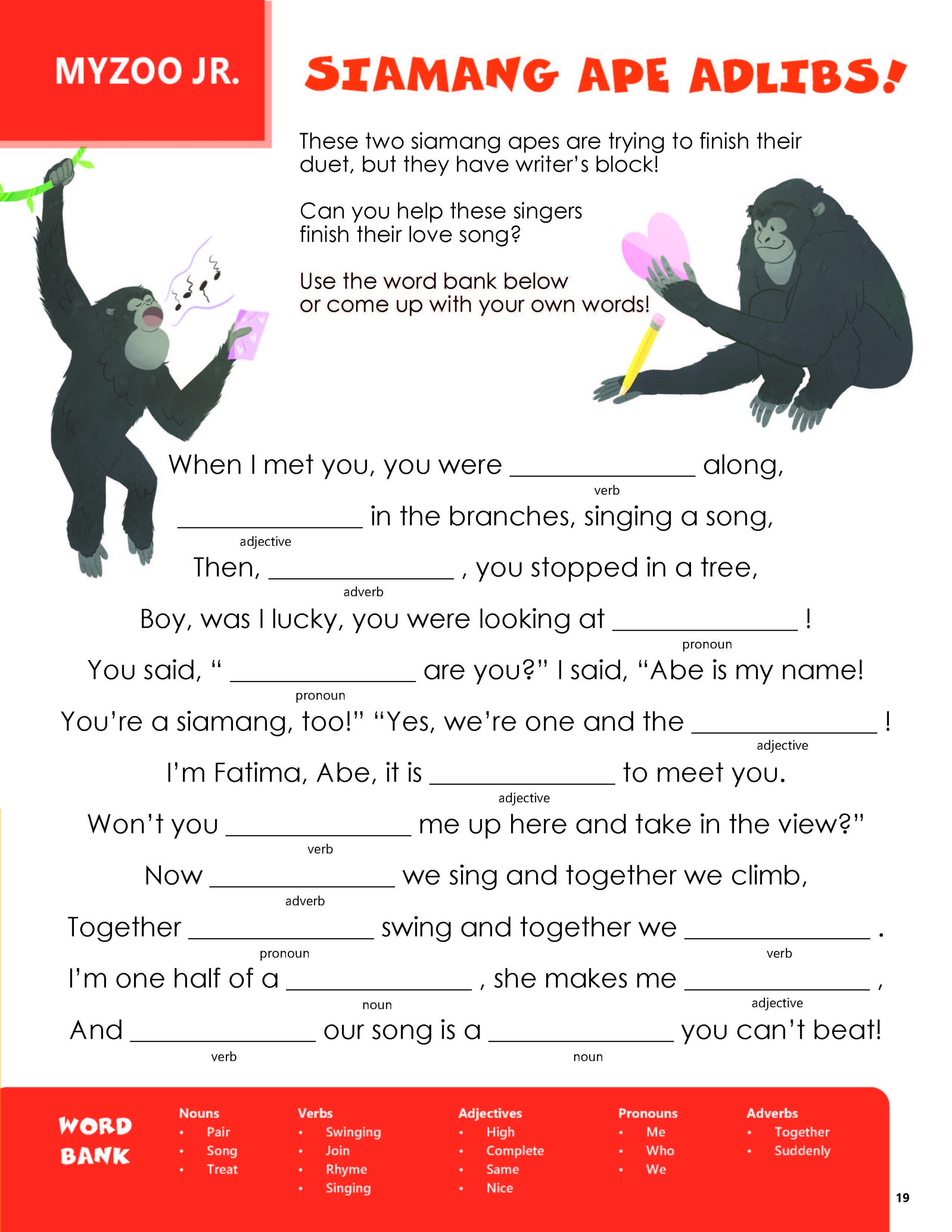Siamang Apes
For siamang apes, vocalization is just part of the morning routine. These long-armed primates, native to the Malay Peninsula and Indonesia, use song to establish a bond and denote their territory to other siamang ape pairs. This species forms monogamous couples that typically stick together their entire lives, and each couple creates a completely unique song together.
“While many of the species in our care – such as blue cranes, elephants, and red wolves – exhibit various mating and courting behaviors, there’s nothing quite as special as hearing our siamangs’ song emanating through the morning sky from atop their lofty perches in Primate Park,” Zoo Executive Director Ted Fox said.
Like a frog, each ape inflates the skin sack on their throat, which swells until it looks like a beach ball. Then, the male and female siamangs perform their unique duet for all to hear. Indeed, the song of the siamangs can be heard from up to five miles away!
For siamang apes, songs play an important role in establishing territory and warning other apes of predators, and the creation of the song is just as interesting as the song itself. Each siamang uses parts of the song which its parents sang and marries it with its partners’ parents’ song. Unlike many other ape species, siamang fathers play a large role in child-rearing. So, siamangs grow up hearing their parents’ song each day – and these unique notes become something of an audial heritage for siamang offspring. Like a puppy watching and hearing elder dogs howl and joining in with its own shrill call, baby siamangs will inflate their little throats and imitate their parents’ vocalizations.
“In coordination with other AZA-accredited institutions, we contribute to and oversee multiple species studbooks, which record the genealogy of each animal in our care to preserve the genetic diversity,” Fox said. “But the siamangs themselves, through their unique songs, create and maintain what is essentially a sonic genealogy of their own family tree.” The Rosamond Gifford Zoo’s male siamang ape, Abe, has been put in the unusual circumstance of creating not one, not two, but three love songs.
Abe’s mate of ten years, Amy, passed away in late 2016. This was the second partner that Abe outlived – and his care team knew they needed to find him another companion quick. Luckily, the zoo coordinated with AZA institutions to find Abe a new partner. The zoo examined the AZA’s Species Survival Program (SSP) for siamang apes, and eventually determined that the best companion for Abe was Fatima, a 34-year-old siamang ape living in Gladys Porter Zoo in Brownsville, Texas.
After the siamang care team began preliminary introductions, it was immediately clear that Abe and Fatima had a connection. Once they had developed their own inimitable love song, it was official – these siamangs were going steady! The pair has lived happily together since 2017, alternating between Primate Park and their habitat in the Social Animals Building. While they haven’t produced any babies together, Abe has sired several children with his previous mates.
In fact, one of Abe’s kids made headlines in 2017, when the siamang apes of the Dickerson Park Zoo (including Abe’s daughter Makali) were the subject of media attention after zoo-goers observed their reaction to the solar eclipse on August 21 of that year. As siamang apes typically perform their duets at sunrise, and sometimes at sunset, visitors were interested to see how the apes would respond to the unexpected shadow. Siamang pair Makali and Lucu didn’t just observe the eclipse – they responded accordingly by erupting into their song.
Abe and Fatima have never before observed a solar eclipse, so the Rosamond Gifford Zoo is brimming with excitement to see how our own long-armed love singers respond to this extraordinary cosmic event! Will Abe take after his daughter Makali and begin to sing? Visit the zoo on April 8 to celebrate the eclipse with us and watch animals like Abe and Fatima (and plenty of others) react to the phenomenon! Glasses will be available in the gift shop for safely viewing the eclipse.



